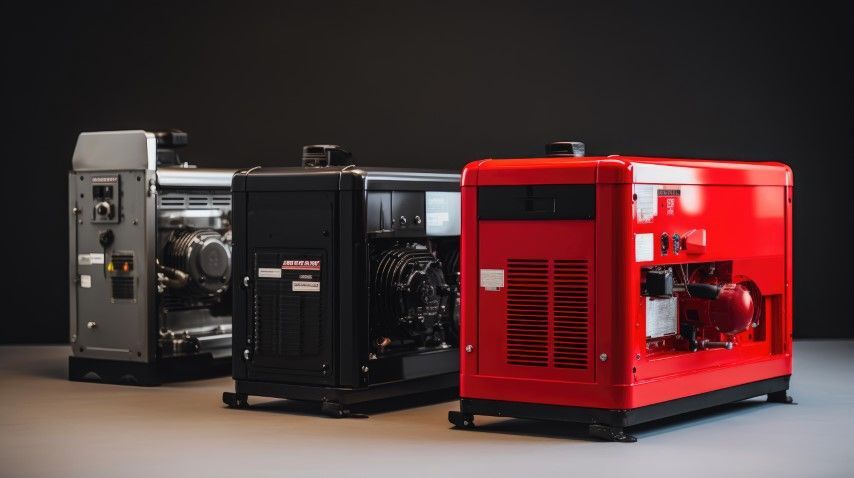
Propane Generators in Columbus OH
A propane generator is a machine that uses propane gas to produce electricity. Unlike traditional gasoline or diesel generators, which rely on those fuels for operation, propane generators operate on propane, a clean-burning and efficient energy source. This type of generator is popular for both residential and commercial use due to its reliability and environmental benefits.
Different Types and Key Features to Consider
When selecting a propane generator, you’ll find a variety of types and features to consider. Portable propane generators are compact and easy to move, making them ideal for camping or emergency use. Standby generators, on the other hand, are designed to be installed permanently and provide a backup power source for your home or business.
Key features to look for include the generator's wattage capacity, which determines how many appliances or systems it can power. Fuel efficiency is another important factor, as it affects how long the generator can run on a given amount of propane. Additionally, noise levels can vary, so consider how much sound you’re willing to tolerate. For those seeking convenience, automatic start functions and remote controls can simplify operation.
How It Works
A propane generator operates through a combustion process. Propane is stored in a tank and delivered to the generator’s engine where it is mixed with air and ignited. This combustion produces energy that drives the engine's crankshaft. The rotating crankshaft then turns the generator’s alternator, which converts mechanical energy into electrical power. This electricity can be used to power your home, business, or any other electrical devices.

We will get back to you as soon as possible.
Please try again later.
Installation and Maintenance
Proper installation of a propane generator is crucial for optimal performance and safety. It typically involves placing the generator on a stable surface, connecting it to a propane tank, and ensuring proper ventilation. For standby generators, professional installation is recommended to comply with local codes and ensure a reliable setup. Maintenance of a propane generator includes regular checks of the fuel level, oil changes, and inspections of the spark plugs and air filters. Propane generators generally require less maintenance compared to gasoline or diesel generators because propane burns cleaner and leaves fewer residues. However, periodic servicing by a professional is still advisable to keep the generator in good working order.
Cost and Investment
The cost of a propane generator varies based on its size, type, and features. Portable models are generally more affordable, with prices ranging from a few hundred to several thousand dollars. Standby generators, being larger and more complex, can cost significantly more, often reaching into the thousands of dollars. When considering the investment, it’s important to factor in not just the purchase price but also installation costs, maintenance expenses, and the price of propane fuel. Over time, the efficiency and lower maintenance needs of propane generators can offer long-term savings compared to other fuel types.
How It Differs from Other Types of Generators
Propane generators differ from other types, such as gasoline or diesel generators, in several ways. Propane is a cleaner fuel, producing fewer emissions and less pollution. This makes propane generators more environmentally friendly. Additionally, propane has a longer shelf life compared to gasoline, meaning it can be stored for extended periods without degrading. Another key difference is maintenance. Propane generators generally require less upkeep because propane burns more cleanly, leaving fewer deposits in the engine. In contrast, gasoline and diesel generators can develop issues related to fuel quality and engine wear.
Applications and Use Cases
Propane generators are versatile and suitable for various applications. For residential use, they provide reliable backup power during outages, ensuring that essential systems like heating, cooling, and refrigeration continue to operate. They are also used for outdoor activities such as camping, where portability and ease of use are important. In commercial settings, propane generators can serve as a backup power source for businesses, preventing downtime during power interruptions. They are also utilized in construction sites, remote locations, and events where a dependable power supply is needed.
If you’re interested in learning more about
propane generators in Columbus, OH, or need assistance choosing the right model for your needs, don't hesitate to reach out. Our team is here to provide expert guidance, answer your questions, and help you make an informed decision. Contact us today to explore your options and ensure you have a reliable power solution for any situation.
How to Pick the Right Propane Generator for Your Requirements
In today’s world, having a reliable power source is more important than ever. Propane generators offer a practical solution for those seeking an efficient and clean energy alternative. Whether you need backup power for your home, a portable solution for outdoor activities, or a dependable source for a business, choosing the right propane generator can make all the difference. This guide will help you navigate the key factors to consider when selecting the best propane generator to meet your needs.

Choosing the right propane generator is essential for ensuring you have a reliable power source tailored to your needs. If you have any questions or need assistance in selecting the perfect generator, we’re here to help. Contact us today to speak with a knowledgeable expert who can guide you through the options and find the best propane generator for your requirements. Your dependable power solution is just a call away!
Determine Your Power Requirements
The first step in choosing the right propane generator is to assess your power needs. Calculate the total wattage required by the devices and appliances you plan to run. For instance, a refrigerator, lights, and a few small appliances will need different power levels compared to running a whole house or a large workshop. Propane generators come in various sizes, so understanding your wattage needs will help you select a generator that provides adequate power without excess capacity.
Consider the Generator’s Power Output
Generators are typically categorized by their power output. This is measured in watts and includes two key figures: starting watts and running watts. Starting watts are necessary to power up appliances and tools initially, while running watts are required for continuous operation. Ensure that the generator you choose has sufficient starting and running wattage to handle your load efficiently.
Evaluate Fuel Efficiency and Runtime
Fuel efficiency and runtime are crucial factors in determining how long a generator can operate on a single tank of propane. Look for a generator with a high fuel efficiency rating to maximize runtime and reduce refueling frequency. Consider the size of the propane tank and how it aligns with your usage needs. Larger tanks offer longer runtimes but may be bulkier, so balance your need for extended operation with available space.
Check for Noise Levels
Noise levels can be an important consideration, especially if you plan to use the generator in residential areas or during outdoor activities. Generators are rated for noise in decibels (dB), and quieter models will be less disruptive. Look for generators with lower noise ratings if you need to minimize sound, especially for camping or backyard use.
Examine the Generator’s Portability and Size
If you need a generator that you can easily transport, consider its size and weight. Portable generators are designed for easy mobility and typically come with handles or wheels. Assess the dimensions and weight of the generator in relation to your storage and transportation needs. For stationary setups, such as home backup systems, portability may be less of a concern.
Review Additional Features
Modern propane generators often come with various additional features that can enhance their usability and convenience. Features such as electric start, automatic voltage regulation, and multiple outlets can add value to your generator. Evaluate these extra features based on how they align with your specific requirements and preferences.
Compare Brands and Warranties
Different brands offer varying levels of reliability, performance, and customer support. Research reputable brands known for producing high-quality propane generators and check their warranty policies. A good warranty can provide peace of mind and protection against potential defects or issues. Read customer reviews and ratings to gauge the experiences of other users.
Propane Generator: Professional Installation or DIY Approach
Choosing between professional installation and a DIY approach for your propane generator can be a daunting decision. Both options have their benefits and potential pitfalls. A propane generator is a significant investment, crucial for providing backup power during outages and ensuring your home or business remains operational. Understanding the differences between professional installation and DIY can help you make an informed choice, ensuring you get the most out of your generator while maintaining safety and compliance with local regulations.
Expertise and Experience
Professional installation offers the advantage of specialized knowledge and experience. Certified technicians have the training to handle the complexities of propane generator systems, including proper placement, connection, and integration with your existing electrical system. They are familiar with local codes and regulations, ensuring that your installation is compliant and safe.
DIY installation, on the other hand, might seem like a cost-effective option. However, it requires a good understanding of electrical systems, propane connections, and safety protocols. Without professional training, the risk of errors increases, which can lead to potential hazards or inefficient operation of your generator.
Safety Considerations
Safety is a paramount concern when dealing with propane generators. Professionals are trained to handle the installation process safely, including securing propane lines, ensuring proper ventilation, and adhering to safety codes. They can identify and address potential hazards that a DIY installer might overlook.
In contrast, DIY installations carry the risk of improper handling of propane and electrical connections. Mistakes in installation can lead to dangerous situations, such as gas leaks or electrical failures. Professional installation minimizes these risks, offering peace of mind that your generator is set up safely and correctly.
Time and Convenience
A professional installation is typically quicker and more efficient. Technicians are equipped with the tools and knowledge to complete the job in a timely manner. They handle all aspects of the installation, from setup to testing, allowing you to focus on other tasks.
DIY installation requires significant time and effort. You'll need to research the installation process, gather tools and materials, and potentially troubleshoot issues that arise. This can be time-consuming and may lead to delays if you encounter problems or make mistakes.
Cost Considerations
While professional installation involves a higher upfront cost, it may save you money in the long run by preventing costly mistakes and ensuring that your generator operates efficiently. Additionally, some professional services offer warranties or guarantees that cover parts and labor, providing added value.
DIY installation can save on labor costs, but it's important to consider the potential for mistakes that could lead to additional expenses. If you make errors or need to hire a professional later to fix issues, the savings from a DIY approach may be negated.
Compliance with Regulations
Local codes and regulations often dictate specific requirements for propane generator installations. Professionals are familiar with these regulations and ensure that your installation complies with all necessary standards. This can help avoid legal issues and ensure that your generator operates safely and efficiently.
DIY installers might not be fully aware of all local regulations, which can lead to non-compliance. This can result in fines or other legal complications, and it might affect your ability to use your generator effectively.
Deciding between professional installation and DIY for your propane generator is an important choice that impacts safety, efficiency, and compliance. For the best results and peace of mind, consider the benefits of professional installation. Our experienced technicians are here to help you with every step of the process, from selecting the right generator to ensuring a flawless installation.
Contact us today to schedule a consultation or learn more about our propane generator installation services. Let us provide you with the expertise and reliability you need to keep your home or business powered and protected.
Let's Connect!
We offer top-notch whole house generator solutions. Our team is dedicated to ensuring your home stays powered during outages. Learn about How Whole House Generators Work in our Buyer's Guide. Don't let unexpected power outages disrupt your life. Contact us today for reliable backup power solutions and embrace a worry-free lifestyle.